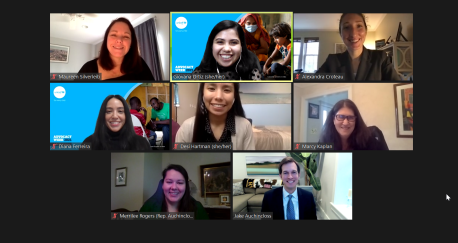
From Sudan to Capitol Hill
UNICEF & WFP Sudan Representatives' Visit to DC
Washington DC, September 2017— UNICEF Sudan Representative, Abdullah Fadil accompanied by WFP Country Director, Matthew Hollingworth (pictured above) took the time to come to Washington, D.C. last week to advocate for the 3.24 million children in Sudan who do not have access to basic services in the areas of education, health, nutrition, water, sanitation, and protection of their rights. The Reps’ mission was to draw attention to the current humanitarian operating environment in Sudan and the initiatives that UNICEF and WFP are leading to provide needed assistance to vulnerable populations in Sudan.
The UNICEF and WFP Representatives discussed the progress they have witnessed from the Sudanese government to increase access for humanitarian efforts over the course of the past year, while also emphasizing the remaining gaps, policy challenges, and other challenges that continue to hinder their aid and development work. This message was carried by both representatives throughout their meetings with Congressional offices, key U.S. government agency personnel, local Sudanese diaspora groups, Sudan's Ambassador to the U.S., Dr. Maowia O. Khalid, and NGOs who are also engaged in Sudan’s future.

Audience members listen to a panel of UNICEF and WFP Sudan Representatives and Country Directors. Photo credit: Ashraf Faden.
UNICEF works to promote the rights and wellbeing of every child in the world, and remains the main advocator and interlocutor for the protection of children including in humanitarian situations in Sudan. Through partnerships, UNICEF enabled 131,227 children to be treated for SAM, representing an increase of 12 per cent in comparison to 115,805 in 2014. In education, 464,228 out-of-school children (46 per cent of girls) were enrolled in school. In health, over nine million children aged of six months to fifteen years received vaccination through a national campaign for which UNICEF mobilized fifteen million doses of vaccines and ensured social mobilization of communities. About three million pregnant women and children under the age of five benefited from the distribution of treated bed nets in five Darfur states.
To continue building on the achievements of previous years, UNICEF is working closely with partners like WFP to support sustainable development in Sudan. The Representatives utilized their time in Washington to share their personal opinions on the positive humanitarian impacts that they feel could be achieved through the lifting of the U.S. sanctions on Sudan, and both Representatives expressed their optimism that progress and momentum can be maintained in a post-sanctions environment.
“Imagine what the Government of Sudan could do with its resources if it used them to help its people. Imagine what the Government of Sudan would do with more resources, if it were not restricted by economic sanctions.” – UNICEF Sudan
Beyond updating others on the work that UNICEF and WFP are leading in Sudan and discussing the issue of U.S. sanctions, the Representatives also encouraged diaspora groups and Congress to remain actively engaged in events unfolding in Sudan and to continue to support programs that put children and the most vulnerable populations first.

UNICEF USA Community Engagement Fellow Abir Ibrahim moderates a conversation with UNICEF Sudan Country Director and Representative, Mr. Abdullah Fadil (left) and Mr. Matthew Hollingsworth, WFP Country Director and Representative (right). Photo credit: Ashraf Faden.
The U.S. sanctions on Sudan were lifted in October 2017, a week after the Representatives’ visit to Washington, D.C. While not everyone can come to Washington, we can all be advocates! Please take a moment to email your Senators and Representatives about UNICEF’s appropriations for Fiscal Year 2018. Click here to send your message. Let’s make sure Congress knows we all want them to put #ChildrenFirst!
About UNICEF
The United Nations Children's Fund (UNICEF) works in more than 190 countries and territories to put children first. UNICEF has helped save more children’s lives than any other humanitarian organization, by providing health care and immunizations, clean water and sanitation, nutrition, education, emergency relief and more. UNICEF USA supports UNICEF's work through fundraising, advocacy and education in the United States. Together, we are working toward the day when no children die from preventable causes and every child has a safe and healthy childhood. For more information, visit www.unicefusa.org.
For more information, contact:
Abir Ibrahim, UNICEF USA, 202.802.9105, aibrahim@unicefusa.org
HOW TO HELP
There are many ways to make a difference
War, famine, poverty, natural disasters — threats to the world's children keep coming. But UNICEF won't stop working to keep children healthy and safe.
UNICEF works in over 190 countries and territories — more places than any other children's organization. UNICEF has the world's largest humanitarian warehouse and, when disaster strikes, can get supplies almost anywhere within 72 hours. Constantly innovating, always advocating for a better world for children, UNICEF works to ensure that every child can grow up healthy, educated, protected and respected.
Would you like to help give all children the opportunity to reach their full potential? There are many ways to get involved.





